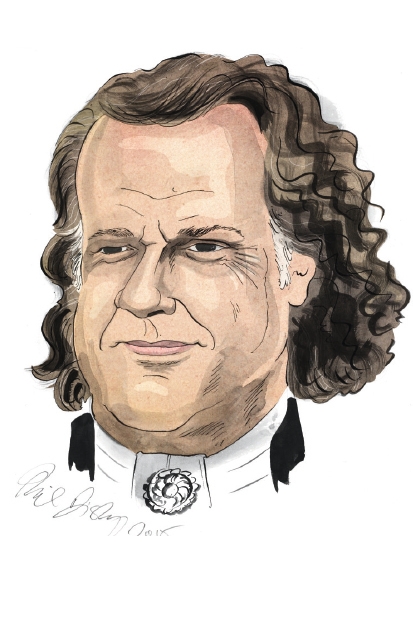When I first encountered the global phenomenon that is André Rieu, I had my heart set on hating him. If that seems unkind, you have to understand that I had been forced to watch hour upon hour of his concerts on the Sky Arts channel that is all but dedicated to him and plays on a constant loop in my parents’ home. The moment my mother discovered the classical music impresario, our lives were never quite the same. Every time I went home to visit, I would find her glued to the television watching Rieu conducting an orchestra full of ladies in crinoline dresses every colour of the rainbow. And she was not just watching as the Dutchman conducted while playing his violin (somehow he does both simultaneously) — she was swaying from side to side as she sat transfixed on the sofa. After a while my father gave up and watched with her. Rather touchingly, I found them both swaying as Rieu conducted Viennese waltzes.

Nevertheless, I started to worry that my mother had been hypnotised by subliminal messages being transmitted beneath the strains of the ‘Blue Danube’. ‘I hope he’s not telling her to send money to the Classical Artists Social Housing fund (please make cheques payable to: CASH),’ I fretted, for such was Rieu’s apparent power. She seemed to have no control over herself while ‘André’, as she took to calling him, was on the telly. ‘Oh André!’ she would exclaim, if a glimpse of an advert for the man came on while we were attempting to watch something on another channel. And that would remind her to switch over to Sky Arts and off we would go again with the waltzes and the crinolines and the flowers and the balloons, and sometimes the horses being trotted around the arena in time to the Radetzky March as audiences full of pensioners gasped in ecstasy, while my parents swayed with delight.
André Rieu — pronounced Reer — conducts an orchestra called the Johann Strauss Orchestra. They play the popular classics we all secretly like better than the more challenging pieces we pretend to favour. They also perform tunes from the shows and the movies, anything that ‘speaks to the heart’, as Rieu, 65, says. Imagine cheesy-listening French pianist Richard Clayderman only older and wiser, with wavier hair and a matinée idol smile so disarming it could effect a truce between Russia and Ukraine.
His shows regularly outsell any other male touring artist in the world, including Bruce Springsteen. His album Forever Vienna reached No. 2 in the British pop chart, the highest ever showing for a classical record; in all he has sold more than 22 million albums and turned classical music into a stadium act.
Rieu started playing the violin aged five. As a student, he decided to pursue the waltz form, and in 1987 formed an orchestra with 12 members. Today, he performs with up to 150 musicians plus guest stars. Rieu is now known as the Waltz King. He is a global businessman, a seemingly unstoppable brand.
Under duress, I arranged tickets for my parents to see his show at Wembley last year. I went along through some morbid sense of curiosity about exactly how much schmaltz a person could absorb before dissolving into a pool of molten sentimentality on the floor. To my utmost horror, I loved it. I abandoned myself to the joy of listening to ‘the best bits’. After ‘O Mio Babbino Caro’ and ‘The White Cliffs of Dover’, life didn’t seem so bad. Abandon yourself to André, I realised, and he will make you happy. Goodbye cynicism. Hello crinolinicism. The clincher was the sight of my mum and dad waltzing in the aisles.
In a few weeks, they will be in the front row at the extravaganza that is his annual open-air concert in Maastricht. They rarely travel abroad these days, but are getting psyched up to board a plane to ‘go to André’, much as a couple of devout pilgrims might plan a trip to Lourdes. All of which led me to ask Mr Rieu’s publicist if the great man would grant me audience.
He could not, sadly, see me at home in his castle — he lives in a castle, keep up. But he did agree to answer my questions by email.
I ask him if he is pleased that he confounds the music critics by playing only the tunes people most want to hear. ‘I choose the music I love and it’s wonderful to see that the audiences love it too,’ he says. ‘Isn’t it strange to think that an artist, just because he is successful, can’t be good? I want to be close to my audience. I communicate with the people, I look them into the eyes. I try to make them forget their triste and boring everyday life.’
His touring schedule is insane, with half the year on the road. How does he stay in one piece with a schedule that would finish off a rock star? ‘I do a lot of sports, I try to eat healthy and of course the music keeps me full of energy,’ he says. ‘I do not work, I have fun. I think that’s the secret. And I never trash hotel rooms.’ He has said that when he is not performing, he doesn’t listen to music. Coals to Newcastle, I suppose. But does he ever long for a time in the past when music was pure pleasure? ‘Music has always been first and foremost a pleasure to me. Always. As a five-year-old I fell in love with my beautiful 18-year-old blonde violin teacher. So I practised a lot just to impress her.’
The records he would pick for his desert island are: ‘The Beautiful Blue Danube’, Ravel’s ‘Pavane pour une infante défunte’, Abba’s ‘The Winner Takes It All’ and Bette Midler’s ‘The Rose’. Imagine hearing those four titles in sequence: that’s Rieu for you.
Does he see any tension between having artistic integrity and making $50 million a year? ‘I own the biggest private orchestra in the world and do not receive funds from any government at all. I have approximately 100 people on the payroll and their families depend on our work. I think that’s pretty unique in the musical world. Every banker would tell you it’s absolutely insane and way too expensive to own an orchestra.’
He seems down to earth for someone Richard Branson has purportedly booked to play at his hotel on the moon, if and when it gets built. What grounds him? His wife, Marjorie, who runs his company, and his two sons, he says. They keep his ego ‘in check’. I ask him if he knows he is a major sex symbol for ladies of a certain age. He is too modest to reply.
It is time to lay my cards on the table. My mother will never forgive me if I don’t. The question my mother would like to ask is: ‘Your wife must be a very special lady. Do you take her with you on tour?’
‘My wife is a very special lady,’ he says diplomatically. ‘We’ve been married for 40 years now and she’s the love of my life. Without her, I would be in the gutter.’ This wasn’t quite the answer my mother hoped for, but when I tell her it elicits an ‘Aah!’ Naturally.







Comments